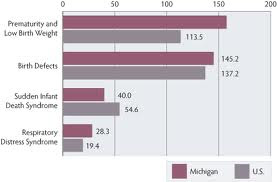 For nearly 30 years, Michigan has been reducing its infant mortality rate. Still, as of 2009, a black infant in Michigan is three times more likely to die than a white baby, according to the latest statistics from 2009.
For nearly 30 years, Michigan has been reducing its infant mortality rate. Still, as of 2009, a black infant in Michigan is three times more likely to die than a white baby, according to the latest statistics from 2009. In fact, the mortality rate for black infants in Michigan for 2009 (15.5 per 1,000 live births) is roughly the same today as for white infants in 1973 (15.2). In the last decade, infant mortality rates for white infants have decreased from 5.9 to 5.4.
“We’re glad that our infant mortality rates have gone down, but we are still ranked 40th in the nation, which is nothing to be proud of,” said Jack Kresnak, president and CEO of Michigan’s Children, a nonprofit advocacy group for children and families. “We have a serious issue here. Babies of color are not seeing their first birthdays.”
Since 1973, the infant mortality rate for black infants in Michigan has been cut by about half. In the same period, infant mortality rates for whites have gone down by about two-thirds. The statewide infant death rate in 2009 was 7.5 deaths per 1,000 births. Michigan suffered 881 infant deaths out of 117,309 live births that year, according to figures from the Michigan Department of Community Health.
bridgemi.com/2011/11/racial-divide-persists-in-michigans-infant-mortality-rate/






